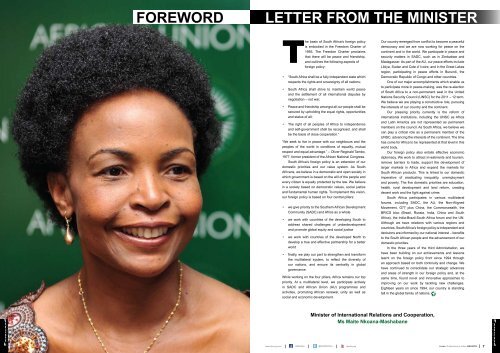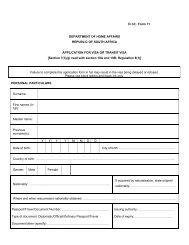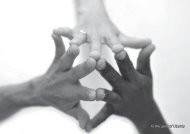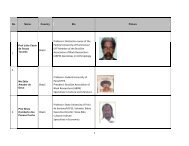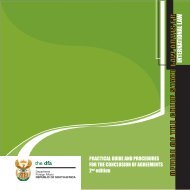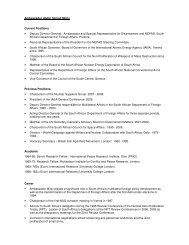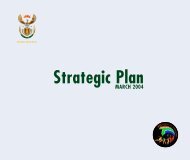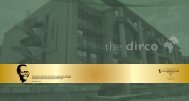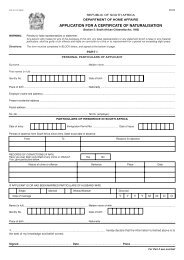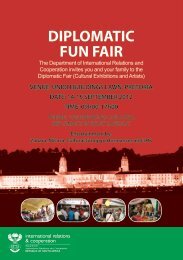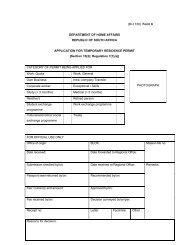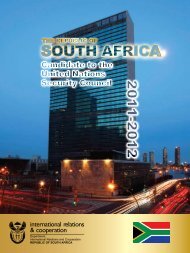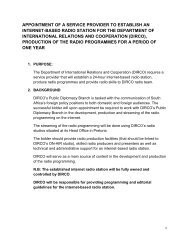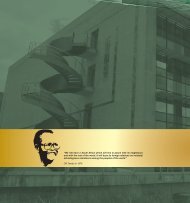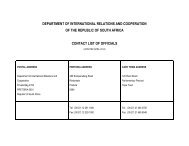UBUNTU Magazine Issue 1 - Department of International Relations ...
UBUNTU Magazine Issue 1 - Department of International Relations ...
UBUNTU Magazine Issue 1 - Department of International Relations ...
Create successful ePaper yourself
Turn your PDF publications into a flip-book with our unique Google optimized e-Paper software.
FOREWORD<br />
LETTER FROM THE MINISTER<br />
The basis <strong>of</strong> South Africa’s foreign policy<br />
is embodied in the Freedom Charter <strong>of</strong><br />
1955. The Freedom Charter proclaims<br />
that there will be peace and friendship,<br />
and outlines the following aspects <strong>of</strong><br />
foreign policy:<br />
• “South Africa shall be a fully independent state which<br />
respects the rights and sovereignty <strong>of</strong> all nations;<br />
• South Africa shall strive to maintain world peace<br />
and the settlement <strong>of</strong> all international disputes by<br />
negotiation – not war;<br />
• Peace and friendship amongst all our people shall be<br />
secured by upholding the equal rights, opportunities<br />
and status <strong>of</strong> all;<br />
• The right <strong>of</strong> all peoples <strong>of</strong> Africa to independence<br />
and self-government shall be recognised, and shall<br />
be the basis <strong>of</strong> close cooperation.”<br />
“We seek to live in peace with our neighbours and the<br />
peoples <strong>of</strong> the world in conditions <strong>of</strong> equality, mutual<br />
respect and equal advantage.” – Oliver Reginald Tambo,<br />
1977, former president <strong>of</strong> the African National Congress.<br />
South Africa’s foreign policy is an extension <strong>of</strong> our<br />
domestic priorities and our value system. As South<br />
Africans, we believe in a democratic and open society in<br />
which government is based on the will <strong>of</strong> the people and<br />
every citizen is equally protected by the law. We believe<br />
in a society based on democratic values, social justice<br />
and fundamental human rights. To implement this vision,<br />
our foreign policy is based on four central pillars:<br />
• we give priority to the Southern African Development<br />
Community (SADC) and Africa as a whole<br />
• we work with countries <strong>of</strong> the developing South to<br />
address shared challenges <strong>of</strong> underdevelopment<br />
and promote global equity and social justice<br />
• we work with countries <strong>of</strong> the developed North to<br />
develop a true and effective partnership for a better<br />
world<br />
• finally, we play our part to strengthen and transform<br />
the multilateral system, to reflect the diversity <strong>of</strong><br />
our nations, and ensure its centrality in global<br />
governance.<br />
While working on the four pillars, Africa remains our top<br />
priority. At a multilateral level, we participate actively<br />
in SADC and African Union (AU) programmes and<br />
activities, promoting African renewal, unity as well as<br />
social and economic development.<br />
Our country emerged from conflict to become a peaceful<br />
democracy and we are now working for peace on the<br />
continent and in the world. We participate in peace and<br />
security matters in SADC, such as in Zimbabwe and<br />
Madagascar. As part <strong>of</strong> the AU, our peace efforts include<br />
Libiya, Sudan and Cote d’ Ivoire; and in the Great Lakes<br />
region, participating in peace efforts in Burundi, the<br />
Democratic Republic <strong>of</strong> Congo and other countries.<br />
One <strong>of</strong> our major accomplishments which enable us<br />
to participate more in peace-making, was the re-election<br />
<strong>of</strong> South Africa to a non-permanent seat in the United<br />
Nations Security Council (UNSC) for the 2011 – 12 term.<br />
We believe we are playing a constructive role, pursuing<br />
the interests <strong>of</strong> our country and the continent.<br />
Our pressing priority currently is the reform <strong>of</strong><br />
international institutions, including the UNSC as Africa<br />
and Latin America are not represented as permanent<br />
members on the council. As South Africa, we believe we<br />
can play a critical role as a permanent member <strong>of</strong> the<br />
UNSC, advancing the interests <strong>of</strong> the continent. The time<br />
has come for Africa to be represented at that level in this<br />
world body.<br />
Our foreign policy also entails effective economic<br />
diplomacy. We work to attract investments and tourism,<br />
remove barriers to trade, support the development <strong>of</strong><br />
larger markets in Africa and expand the markets for<br />
South African products. This is linked to our domestic<br />
imperative <strong>of</strong> eradicating inequality, unemployment<br />
and poverty. The five domestic priorities are education,<br />
health, rural development and land reform, creating<br />
decent work and the fight against crime.<br />
South Africa participates in various multilateral<br />
forums, including SADC, the AU, the Non-Aligned<br />
Movement, G77 plus China, the Commonwealth, the<br />
BRICS bloc (Brazil, Russia, India, China and South<br />
Africa), the India-Brazil-South Africa forum and the UN.<br />
Although we have relations with various regions and<br />
countries, South Africa’s foreign policy is independent and<br />
decisions are informed by our national interest – benefits<br />
to the South African people and the advancement <strong>of</strong> our<br />
domestic priorities.<br />
In the three years <strong>of</strong> the third Administration, we<br />
have been building on our achievements and lessons<br />
learnt on the foreign policy front since 1994 through<br />
an approach based on both continuity and change. We<br />
have continued to consolidate our strategic advances<br />
and areas <strong>of</strong> strength in our foreign policy and, at the<br />
same time, found novel and innovative approaches to<br />
improving on our work by tackling new challenges.<br />
Eighteen years on since 1994, our country is standing<br />
tall in the global family <strong>of</strong> nations.<br />
Foreword<br />
Minister <strong>of</strong> <strong>International</strong> <strong>Relations</strong> and Cooperation,<br />
Ms Maite Nkoana-Mashabane<br />
www.dirco.gov.za DIRCOza<br />
@theDIRCOza thedircoza <strong>Issue</strong> 1 diplomacy in action <strong>UBUNTU</strong><br />
7<br />
Foreword


